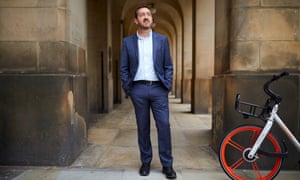At the end of a wobbly month for everyday cycling, it is depressing to hear that it has become too scary to contemplate even for one of its great paragons. Days after ugly generalisations in some media followed the conviction of a man involved in a fatal collision with a pedestrian in east London, Chris Boardman told the Guardian that, despite being rather handier on a bike than your average commuter, a sense of danger is getting to him.
“The roads are statistically safe, but it doesn’t look it and it doesn’t feel it,” the former Olympic champion said as he prepared to start a new job as the first cycling and walking commissioner for Greater Manchester. “Now I try to do more of my riding off-road, which is sad.”
Boardman’s comments are a big deal – and indeed sad – because he is arguably responsible, at least more than any other individual, for the British cycling boom to which our cities are adjusting. No British track cyclist had won an Olympic gold medal for 72 years when he triumphed on the track in 1992. Sir Bradley Wiggins has said that it was while watching that victory as a 12-year-old that he decided he wanted to become a cyclist. In retirement, Boardman lent his technical expertise to the next generations of Team GB riders and has worked beyond the racetrack as an advocate and safety campaigner.
So if someone like Boardman – a serious, rational man – is suggesting that he might be cowed by what he describes as the “exhausting” assault course of risk and anger on our roads, we should all pause and listen. He speaks with yet more authority as the grieving son of Carol Boardman, who died last year after being struck by a pickup truck while she was cycling in Deeside.
I only hope that Boardman achieves what must have been his aim – to focus minds in Manchester and beyond as he sets out to encourage more of us to cycle. But my fear is that, by suggesting that even he is too fearful to ride, he risks discouraging the very people he needs to convince.

A 2014 survey by Transport for London found that occasional cyclists feel safer in traffic as they gain experience. But when asked to rank barriers to cycling in the first place, 80% cited safety concerns as the biggest. This echoes what I hear no less now than when I started riding regularly over a decade ago: so many of us would ride to work – or wherever – if we felt it wasn’t just a shortcut to hospital or worse.
But it really isn’t. Boardman is right to mention the stats. Because cycling is getting safer, and can only get safer still as our city planners make better use of our roads. For years I have cycled into central London via Oval and the notorious gyratory at Vauxhall. Today, making the same journey via a segregated lane is a joy I could not have imagined. I believe the lanes also encourage cyclists, including me, to ride more calmly than we did when it felt like a war footing was the only way to survive.
Similar lanes are spreading across the city and more slowly elsewhere, including in Manchester, where Boardman and his new boss, the mayor Andy Burnham, have big plans. Measures like these give confidence to nervous and would-be cyclists, increasing safety – real and perceived – in a way dozens of cities in Europe have embraced for decades. But we have to encourage people to try them while we encourage cities to build more of them. Pushing for improved safety requires highlighting danger, but that should not come at the expense of heightening fear.
We also need to tackle the sense that everyone on our roads is angry, a narrative boosted by the bizarre anti-cycling instincts of a large number of road users – and, I believe, the rise of helmet cameras and dashcams and the viral potential of their footage. Because while it sometimes doesn’t look or feel like our roads are safe, and while it can feel like everyone is out to get everyone else, neither is true. I have rarely encountered real rage while cycling, much less serious near misses. If I wore a helmet camera, the results would be immensely dull.
Perhaps I’ve been lucky and I sympathise with people who have bad experiences a lot more often. And I’m not saying there isn’t still a lot to be done, not least in tackling the corrosive idea that people on bikes are somehow a breed apart, and that we can all be defined by the reckless actions of the few, amplified in parts of the media in a way that rarely happens when other road users do wrong. 80% of “cyclists” hold driving licences. We’re the same people. I can think of no better ambassador for cycling to do this work than Chris Boardman. I hope he’ll soon be back on the roads, leading from the saddle.
• Simon Usborne is a freelance feature writer and reporter based in London



